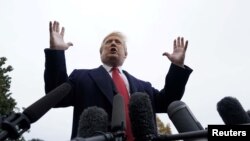The Trump administration is downplaying the significance of a report issued Friday that included dire predictions about the impact of climate change in the U.S. The White House said the study was largely based on "the most extreme scenario" and doesn't account for new technology and other innovations that could diminish carbon emissions and the effects of climate change.
The National Climate Assessment, the fourth edition of a congressionally mandated report on climate change, noted that disasters caused by weather are becoming more common. The report, prepared by more than 300 researchers in 13 U.S. government departments and agencies, predicts that those events will become more common and more severe if steps aren't taken "to avoid substantial damages to the U.S. economy, environment, and human health and well-being over the coming decades."
White House spokeswoman Lindsay Walters noted that work on the assessment began under the administration of former U.S. president Barack Obama and uses multiple modeling scenarios to assess the effects of climate change. But the report issued Friday, according to Walters, relies too heavily on the worst-case-scenario.
"The report is largely based on the most extreme scenario, which contradicts long-established trends by assuming that, despite strong economic growth that would increase greenhouse gas emissions, there would be limited technology and innovation, and a rapidly expanding population," Walters said in a statement.
She said the next climate assessment, which will be prepared over the next four years, will "provide for a more transparent and data-driven process that includes fuller information on the range of potential scenarios and outcomes."
Walters also pointed out that, since 2005, carbon dioxide emissions related to energy production in the U.S. have declined 14 percent, while global emissions continue to rise.
While that's true, the U.S. remains the second largest emitter of carbon dioxide, behind only China.
The Trump administration has rolled back several environmental regulations put in place during the Obama administration and has promoted the production of fossil fuels.
Last year, President Trump announced his intention to withdraw the United States from the 2015 Paris Agreement, which had been signed by nearly 200 nations to combat climate change. He argued the agreement would hurt the U.S. economy and said there is little evidence in its environmental benefit.
Trump, as well as several members of his Cabinet, have also cast doubt on the science of climate change, saying the causes of global warming are not yet settled.
White House Bureau Chief Steve Herman contributed to this report.







